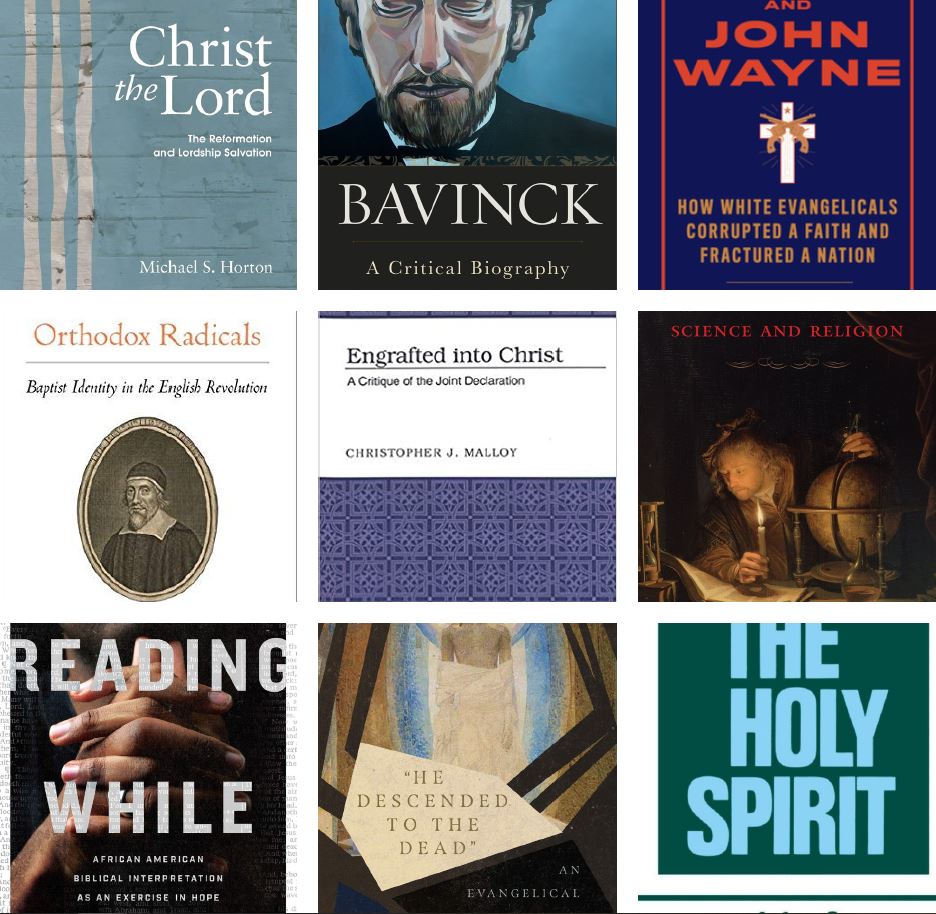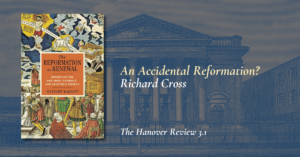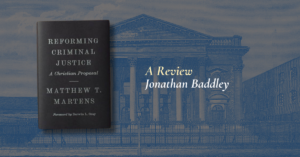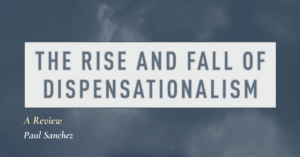Here at the London Lyceum we love to recommend great resources that will get you thinking. To that end we’ve gathered a brief list of some of the top books read this year by our editorial board and our fellows. We plan to provide this list on an annual basis going forward. As a note: These may or may not have been published in 2020 but were at least read in 2020. Also note, several of our fellows have their own full lists at their websites you can check out too!
Bavinck: A Critical Biography, James Eglinton

“One of the pressing questions of our day, or any day, is how to be orthodox in the age in which we live. While fresh ways of answering this question are posed almost daily, I believe one of the most insightful examples lies in the not too distant past. Herman Bavinck was a dogmatician par excellence, and he, too, was simply an orthodox man trying to make his way in the modern world. In his critical biography, Eglinton brilliantly captures the way in which Bavinck sought to answer the above question, and his example is one that ought to be retrieved on our own cultural moment.” – Cody Floate
“One of my favorite books of this year was James Eglinton’s work, “Bavinck: A Critical Biography.” Having read a good bit of Bavinck and having read a previous full length biography on Bavinck, I was excited to dig into this new groundbreaking work. This work, while adding to the literature demonstrating how strong of an intellect and how gifted a churchman Bavinck was, newly demonstrates the inner workings of the mind and journey of the man, and as one with an interest in Bavinck, each page revealed new aspects of his life, including an occasional view of the anxieties and sorrows of a man many call “hero.” It was a great read!” – J. Ryan Davidson
The Rise and Triumph of the Modern Self, Carl Trueman

“This isn’t so much a recommendation; it is a plea for pastors to read this book. The Rise and Triumph of the Modern Self will help us to understand the culture we inhabit and the church members we serve. This book is as good as advertised. The hype is real.” – Brandon Ayscue
Listen to our episode with Carl about his new book wherever you get your podcasts. Episode #82.
Jesus and John Wayne: How White Evangelicals Corrupted a Faith and Fractured a Nation, Kristin Kobes Du Mez

“Du Mez’s book is vital reading for anyone within evangelicalism, especially if you care about issues of gender, complementarianism and the like. Her central claim, meticulously evidenced, is that evangelical culture over the last 60 years or so has developed a problematic intertwining of authority-driven masculinity, a violent political agenda and a sense of cultural embattlement. The result, of course, is that gender has been less theologically-refined and Christlike, and far more idolatrous. It is a book that will challenge most readers who bear some relationship with gender debates in the American church, but challenges such as these are crucially important for the growth and well-being of the church.” – Fellipe do Vale
Eight Women of Faith, Michael A.G. Haykin

“I took a course this past summer at Heritage Theological Seminary with Dr. Michael Haykin and Dr. Linda Reed where Eight Women of Faith was one of the assigned textbooks. As has been my experience with Haykin’s writing, it was an easy and captivating read. His ability to hone in on specific elements of a person’s life has enabled him to write about well-known figures in a fresh and enlightening way, and this book was no exception. In this book, he briefly showcases eight women from the Reformation and post-Reformation who serve as faithful examples of Christian piety. This book is unique in its specific focus on women in the life of church (a topic that has been neglected in the past). The lessons that are drawn from the lives of these eight women are encouraging and will serve to spur the faith of anyone who reads about them. I am glad I had the opportunity to read this book, and I trust that you will as well.” – Jordan Senecal
The Territories of Science and Religion, Peter Harrison

“The book that I was most enthralled by this year was actually delivered as one of the Gifford Lectures (2011). In The Territories of Science and Religion, Peter Harrison argues that the shift in conceiving of religio and scientia as virtues to seeing them as external practices (a shift that began to occur in the early modern period) is in part what has led to the–supposed–modern conflict we see today. Approaching the “conflict” in terms of virtue was a paradigm shift for me.” – Chris Woznicki
Christ the Lord: The Reformation and Lordship Salvation, Edited by Michael Horton

“My favorite book of 2020 was “Christ the Lord” edited by Michael Horton. Horton, along with a superb group of writers including men such as Robert Godfrey, deals with the late 1980s and early 1990s controversy surrounding “Lordship Salvation” involving men like John MacArthur and Zane Hodges. While the book is a little dated, the substance of the book is desperately needed still. This book provides a balanced treatment of justification, saving faith, repentance, and sanctification showing how much the evangelical church needs retrieval from the Protestant Reformation on these issues. Faithful pastoral ministry must handle the law and the gospel well. This book will equip pastors in that area.” – Jake Stone
Gentle and Lowly: The Heart of Christ for Sinners and Sufferers, Dane Ortlund

“My favorite book from 2020 was Gentle and Lowly, by Dane Ortlund. Ortlund puts his arm around the reader and guides us into the glories of Christ’s heart. His book is a modern-day classic!” – Mitch Chase
“He Descended to the Dead”: An Evangelical Theology of Holy Saturday, Matthew Emerson

“Emerson’s book is helpful for the pastor and the theologian on many fronts. I found his work to be exegetically defensible, historically informed in regards to the doctrinal development of the descent, and it stimulated my theologizing on the relationship of Christ’s flesh and his soul in understanding the hypostatic union of the human nature. As a pastor, this book has impacted the way I will provide counsel to troubled souls and to those who are facing death; Christ’s soul suffered on the road to Calvary, and He can soothe our suffering souls, and Christ experienced death like us, and we need not be afraid because He has gone before us and has overcome death, Hades, and the grave.” – Aaron Pendergrass
Listen to our episode with Matt about his new book wherever you get your podcasts. Episode #27.
Engrafted in Christ: A Critique of the Joint Declaration, Christopher Malloy

“Malloy is a Catholic theologian, and his discussion of Justification is very helpful (though of course I think his Catholic view is wrong). He draws the right distinctions, he engages the primary sources of the Lutheran/Catholic dialogues and the Catholic councils, and he’s a pointed critic of the Joint Declaration on the Doctrine of Justification. Since I’m very critical of the JDDJ myself, it was very interesting to see some of my concerns voiced from the other side of the aisle as well, from a knowledgeable Catholic theologian.” – Guillaume Bignon
Reformed Preaching: Proclaiming God’s Word from the Heart of the Preacher to the Heart of His People, Joel Beeke

“I found Joel Beeke’s Reformed Preaching (Crossway, 2018) to be a valuable resource this year. The way he works through the definition, history, and various illustrations (preachers) through history has deepened my understanding and appreciation for what is known as “reformed preaching.” As Beeke traces its impact and beauty through the centuries, he makes a strong, edifying case that what churches need is a philosophy of preaching that is committed to allowing the Scriptures to do the “heavy lifting,” both in drawing sinners to repentance and sanctifying his people. I am a better preacher for having read it, and will certainly reference it for years to come.” – Conner McMakin
Orthodox Radicals: Baptist Identity in the English Revolution, Matthew Bingham

“I mostly read philosophy or philosophically inclined theology these days, but this book by Matthew Bingham was absolutely splendid. I think it definitively pummels the myth of a single generic “big B Baptist” identity. Bingham is a delight to read too. Few books are as well written as his. Not to mention that there are hundreds of fascinating areas throughout this book that remain to be researched too–a gold mine for Baptists seeking to retrieve and resource their own tradition! I wrote a full review of it over at Themelios you can check out for more.” – Jordan Steffaniak
Listen to our episode with Matthew about his new book wherever you get your podcasts. Episode #58.
Movies Are Prayers: How Films Voice Our Deepest Longings, Josh Larsen

“Growing up I was taught that there are basically four kinds of prayer: adoration, confession, thanksgiving, and supplications; but, as anyone who has read the Bible (especially the Psalms) knows, there are more kinds of prayer than the simple ACTS acronym lets on. Josh Larsen’s Movies Are Prayers (InterVarsity Press, 2017) presents a more-fine-grained taxonomy of prayer (with some nine categories, including prayers of lament and of joy, among others), and Larsen, who is a film critic, uses a large and diverse set of movies as a window into this taxonomy. I learned some things about film criticism from this book (and added many classics to my to-watch list), but I learned even more about prayer. Larsen’s book helped me to approach both movies and prayer more thoughtfully (and it will also encouraged me to watch more movies!), but it also presents a compelling picture of the beauty of the Christian faith” – Taylor Cyr
Pneumatologia, John Owen

“My favorite book I read in 2020 was John Owen’s ‘Pneumatologia.’ It has a well-deserved reputation as a classic expression of Reformed reflection on the person and work of the Holy Spirit. Owen’s careful Trinitarian theology provides a framework for understanding the person and work of the Spirit in ways beneficial for both piety and theology while helping us avoid the contemporary excesses often associated with a pneumotological emphasis. Reading this work has felt like a final piece of Trinitarian theology coming into sharp focus.” – Jacob Denhollander
Remember Death: The Surprising Path to Living Hope, Matthew McCullough

“I read a lot of books in 2020, some academic and some popular. But, surprisingly to me, one of my favorite books I read this year was Remember Death by Matthew McCullough. He’s an exceptional writer and the message of the book stuck with me all year. I thought the book would be about dealing with grief over the death of a loved one, but it was really about the spiritual good of considering one’s own mortality, which is especially important for those who might not think much about death. Reading this book was the kind of experience that I think I’ll always remember, because it confronted me in a fresh way with the problem of death, and it helped me to channel that death-awareness into a deeper appreciation of life and the gospel. Every pastor should read and confidently hand this book to church members.” – Garrett Walden
Reenchanting Humanity: A Theology of Mankind, Owen Strachan

“One of my favorite reads in 2020 was Owen Strachan’s Reenchanting Humanity. Solid books discussing theological anthropology that put the cookies on a reachable shelf are rare indeed. Strachan comes through with a helpful volume that addresses weighty matters of the theology of humanity, but in a style that is accessible for a high school student, adult parishioner, pastor or scholar alike, who is seeking to study the image of God in man and many of the implications of that doctrine in our day. It is no surprise that he concludes that for humanity to be ultimately reenchanted, one must be united to Christ, who is the Image of God (2 Cor 4:4).” – Jason Alligood



